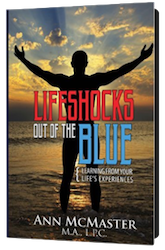Letting Go – Part 3 – Fear and Excitement
Fear and excitement are the same emotion – one is equated with a sharp inhale which is held indefinitely, cutting off the supply of oxygen to the brain, which then mandates fight, flight or freeze. The other emotion is represented by a long and thorough exhale (sometimes quiet and serene, sometimes noisy and uninhibited).
On any amusement park roller coaster, you can see both emotions exhibited quite clearly on any ride. There are those who clamp their hands around the bar, squeeze their eyes shut, hunch down and hold onto their breath for as long as they can – enduring the ride. Then there are those who have their hands in the air, mouths wide open – screaming bloody murder, letting go of any hold-back, squeezing every bit of excitement they can out of a very short ride.
Life is like that – just like that. Whether we are riding a roller coaster or raising children or climbing our career ladder or making love or grocery shopping or going to school or exercising or dealing with a loss or illness … or … or.
The choice is simple – shut down to exactly what is happening or live into it. One way is an existential death, the other way gives honor to the moment we're given – whether we like that moment or not.
I've done both – often; one way is more fulfilling than the other.





Interesting you mention “freeze” as the third alternative. I tend to use “fright” as the third alternative, which includes “freeze” but is a superset.
The way I explain it is that in modern day times, quite often when confronted with a stressor, such as a boss with unreasonable demands, we go into fight/flight, but are not really able to kill the boss or run away from the job (we need the money). This isn’t really a “freeze” response, but does bottle up a lot of energy that ultimately results in a lot of long-term physiological side-effects such as high blood pressure, adrenal fatigue etc.
The fright response is NOT a freeze response in that the body IS doing something, releasing high levels of stress hormones over long periods of time, which the body was never designed to handle.
Ultimately, it does lead to “existential death”, but its preceded by prolonged exposure to hormonal/adrenal/cardiovascular overload.
It’s the slow boiling of the frog in the water who’s temperature is slowly turned up, unnoticed.
Enjoying (and learning from) this series, Ann. Keep it up!
I’m exploring the apparent correlation between Fight/Flight/Freeze and the three primal emotions of Anger, Fear and Shame respectively. The Shame reaction is one that seems to be overlooked. It’s that place of abjectly low self-esteem which leaves us paralyzed, trapped in a box of impossibility, incapable of either fighting or fleeing. These two are ‘active’ energetic reactions. Shame, on the other hand, compels me to become passive, frozen, at the mercy of my situation. My understanding is that these 3 reactions correlate to 3 different personality types, meaning that we each tend towards one of these modes of reacting – fight, flight or freeze – depending on whether our personality type tends to express anger, fear or shame.
Hi there! Do you use Twitter? I’d like to follow you if that would be ok. I’m definitely enjoying your blog and look forward to new updates.
Your means of explaining everything in this piece of writing is genuinely pleasant, all can simply be aware of it, Thanks a lot.
Your means of explaining everything in this piece of writing is genuinely pleasant, all can simply be aware of it, Thanks a lot.